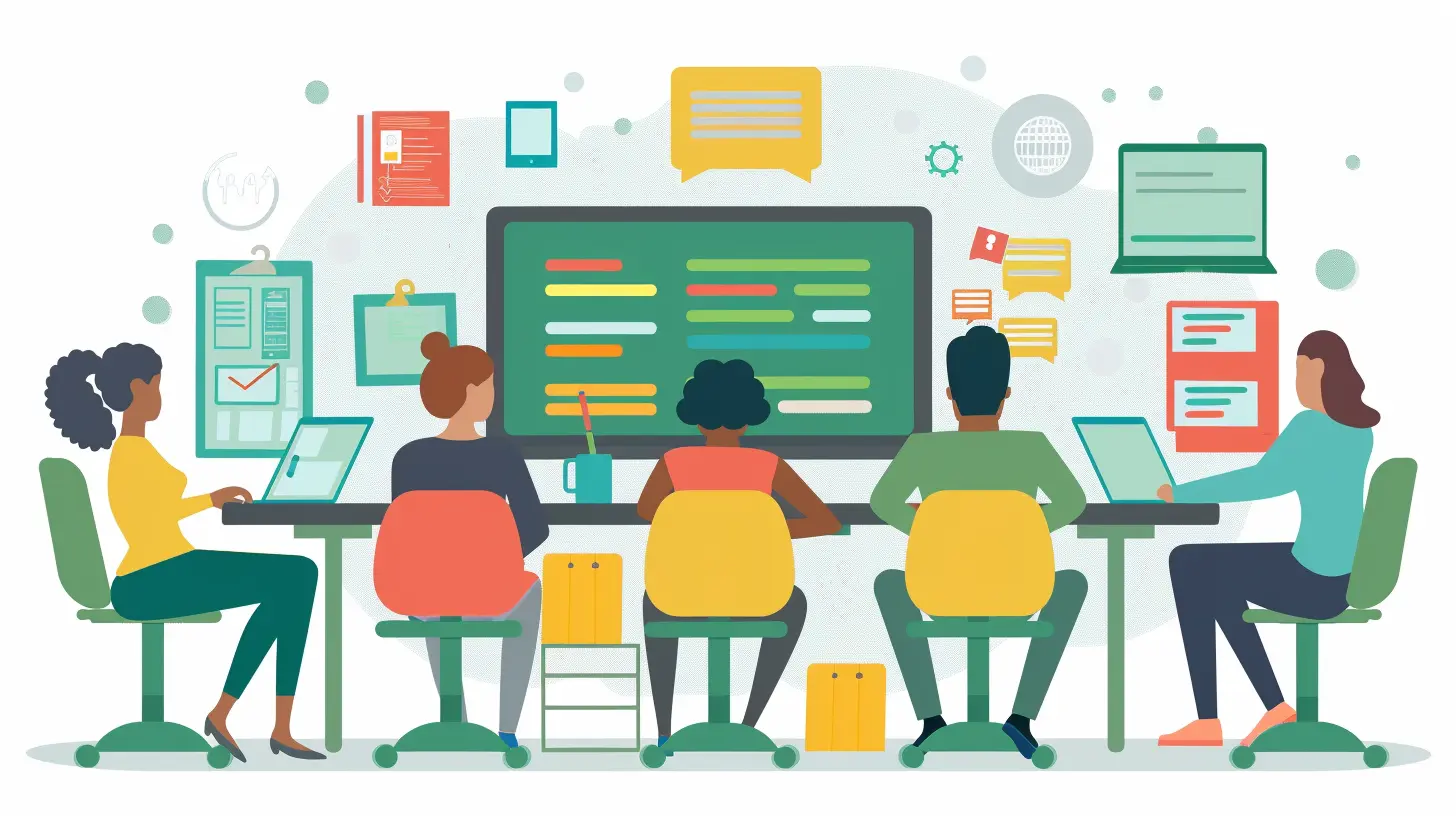Enhancing Assessment with Technology: Moving Beyond Traditional Tests
15 January 2025
Assessments have always been a cornerstone of education. Whether you're a teacher, student, or parent, you know the drill: Study, take a test, and wait for the results. For decades, traditional tests—think multiple-choice, true/false, and essays—have been the go-to method for gauging student learning. But here's the thing: Education is evolving, and so should our approach to assessment.
In walks technology, offering a fresh perspective on how we measure progress in learning. Now, educators and students alike can move beyond the confines of paper-based tests, opening up new ways to evaluate understanding, knowledge, and skills.
So, how exactly can technology enhance assessments? And more importantly, why should we care?
Let’s dive in.

Why Traditional Tests Aren't Enough
The Limitations of Multiple-Choice and Essays
Traditional tests are often limited in scope. Sure, they can measure factual knowledge and a student's ability to recall information, but they fall short when it comes to assessing critical thinking, creativity, and problem-solving skills.Take multiple-choice questions, for example. They're great for testing whether students know specific facts, but they don't really show if a student can apply that knowledge in real-world scenarios. And essays? They might reveal more about a student's thought process, but grading them is often subjective, and they take a long time to assess.
Think of it like trying to measure the depth of the ocean with a ruler—it’s not going to give you the full picture.
One-Size-Fits-All Doesn't Fit Anymore
Another problem with traditional tests is that they assume every student learns in the same way. In reality, students have different learning styles. Some excel in written tests, while others may thrive in interactive or practical assessments. By sticking to one format, we’re not giving all students the opportunity to show what they know in a way that suits their strengths.Technology can help address these limitations and offer a more well-rounded, personalized approach to assessment.

The Role of Technology in Modern Assessments
Adaptive Learning and Testing
Imagine a test that adjusts based on how well you're doing in real-time. That's what adaptive learning systems do. These systems use algorithms to change the difficulty of the questions based on the student's performance.If a student answers a question correctly, the next one might be harder. If they struggle, the system offers easier questions or even hints to guide them. This way, students are constantly challenged at the right level, making assessments more personalized.
Adaptive learning isn't just about testing—it's about learning as you go. Students can immediately see where they went wrong and get the help they need to improve. It's like having a tutor right beside you during the test, giving you feedback and adjusting the lesson plan on the fly.
Gamification of Assessments
Ever notice how a good game can keep you glued to your seat for hours? Now, imagine if assessments were as engaging as your favorite video game. That’s the idea behind gamified assessments.By incorporating elements like point systems, leaderboards, and challenges, educators can turn assessments into an interactive experience. Students are more likely to stay engaged and motivated, which leads to better learning outcomes.
For example, instead of just answering a set of math problems, students might solve puzzles, unlock levels, or earn badges as they demonstrate their skills. This sense of accomplishment can make assessments less stressful and more enjoyable.
Real-Time Feedback
One of the biggest advantages of technology-enhanced assessments is the ability to provide real-time feedback. Traditional tests often keep students waiting days or even weeks for their results. By the time they get their feedback, they've already moved on to the next topic, making it harder to improve on past mistakes.With technology, students can get instant feedback on their performance. Whether it's a quiz, an interactive simulation, or an online exercise, students can immediately see what they got right and wrong. This allows them to learn from their mistakes right away, reinforcing the learning process.
Real-time feedback is like having a mirror that shows you exactly what you're doing right and where you need to improve, right when you need it the most.

Types of Technology-Enhanced Assessments
Digital Portfolios
Instead of relying solely on exams, educators can encourage students to build digital portfolios. These portfolios can include a range of work—essays, videos, presentations, research projects, or even coding assignments.Digital portfolios allow students to showcase their skills and progress over time, offering a more comprehensive view of their abilities. It’s like a scrapbook of learning, where each piece adds to the bigger picture of what the student knows and can do.
Not only does this approach offer a broader assessment of student capabilities, but it also prepares students for the real world. After all, in many professions, your portfolio is your resume.
Simulations and Virtual Labs
Remember the days of dissecting frogs in biology class? Well, with virtual labs and simulations, students can now perform complex experiments online without the need for physical materials. These tools allow students to test hypotheses, explore different outcomes, and engage in hands-on learning—minus the mess and the smell.Simulations are especially useful in subjects like science, engineering, and healthcare, where practical experience is key. They offer a safe, controlled environment where students can make mistakes and learn from them without real-world consequences.
An added benefit? Simulations can be repeated as many times as needed, giving students the chance to practice and perfect their skills.
Peer and Self-Assessments
With the help of technology, peer and self-assessments have become more streamlined and effective. Students can review each other's work, provide constructive feedback, and even assess their own performance using guided rubrics.This kind of assessment encourages students to take ownership of their learning and fosters a sense of responsibility and collaboration. Plus, peer assessments can offer new perspectives that students might not get from teacher feedback alone.
It’s like having a study group where everyone is both the student and the teacher, learning from and teaching each other.
AI-Powered Writing Assistants
One of the more exciting advancements in technology-enhanced assessment is the use of AI-powered writing assistants. Tools like Grammarly and others can assess the quality of a student's writing in real-time, offering suggestions for improvement in areas like grammar, style, and clarity.More advanced AI tools can even provide feedback on the structure and content of an essay, helping students improve their critical thinking and argumentation skills. It's like having a personal writing coach that’s available 24/7.

The Benefits of Technology-Enhanced Assessments
Personalization
One of the biggest advantages of using technology in assessments is the ability to personalize the experience. We already mentioned adaptive learning, but technology also allows for differentiation in the types of assessments students can choose from. Some students might do better with project-based assessments, while others might excel in quizzes or simulations.By giving students options, we can better cater to individual learning styles and needs, making assessments more fair and effective.
Engagement
Let’s face it: Traditional tests can be boring. Technology offers more engaging, interactive, and fun ways to assess learning. Whether it’s through gamification, simulations, or multimedia projects, students are more likely to stay interested and motivated.And when students are engaged, they’re more likely to retain information and perform better.
Immediate Insights for Teachers
It’s not just students who benefit from real-time feedback—teachers do too. Technology-enhanced assessments provide immediate insights into student performance. Teachers can quickly identify areas where students are struggling and adjust their instruction accordingly.This data-driven approach allows for more targeted teaching, helping students improve faster and more effectively.
Challenges and Considerations
Digital Divide
While technology offers many benefits, it's important to remember that not all students have equal access to it. The digital divide is a real issue, and educators must ensure that all students have the resources they need to participate in technology-enhanced assessments.Schools and policymakers will need to work together to address this issue, ensuring that technology is accessible to everyone, regardless of socioeconomic background.
Privacy Concerns
With the rise of digital assessments comes the need for strict data privacy protocols. Students’ personal information and performance data must be protected to avoid misuse. Schools and technology providers must prioritize security and transparency when implementing these tools.Training for Educators
Technology is only as good as the people using it. Teachers need proper training to effectively implement and manage technology-enhanced assessments. Without the right support, even the most advanced tools can fall flat.Thankfully, many platforms offer professional development resources, and schools can invest in ongoing training to ensure educators are confident in using these new tools.
Conclusion
We’re living in a digital age, and it’s time our assessments caught up. Technology offers countless opportunities to improve the way we evaluate student learning. From adaptive testing to gamification, digital portfolios to real-time feedback, the possibilities are endless.By embracing these innovations, we can move beyond traditional tests and create a more personalized, engaging, and effective assessment experience for all students. The future of education is bright—and it’s powered by technology.
all images in this post were generated using AI tools
Category:
Educational TechnologyAuthor:

Anita Harmon
Discussion
rate this article
18 comments
Elsinore Fuller
Embracing technology in assessment fosters creativity and deeper understanding, allowing educators to truly gauge student learning beyond conventional testing methods.
February 22, 2025 at 1:55 PM

Anita Harmon
Thank you for your insightful comment! I completely agree that embracing technology can transform assessment practices, enabling a richer understanding of student learning.
Yolanda Sharpe
This article effectively highlights how technology can transform assessments, fostering personalized learning experiences and better engagement, while addressing the limitations of traditional testing methods.
February 3, 2025 at 3:50 AM

Anita Harmon
Thank you for your feedback! I'm glad you found the article effective in showcasing the transformative role of technology in assessments.
Easton McQuaid
This article highlights a critical shift in education. Embracing technology for assessment not only diversifies evaluation methods but also fosters deeper learning. It's a reminder that traditional tests often fall short; innovative approaches can better capture student understanding and skills.
January 31, 2025 at 9:05 PM

Anita Harmon
Thank you for your insightful comment! I completely agree—integrating technology in assessment can truly transform how we evaluate and support student learning.
Bailey McQuillen
Great insights! Embracing technology in assessments can truly transform learning experiences, providing diverse opportunities for students to showcase their understanding and skills beyond traditional formats.
January 27, 2025 at 12:51 PM

Anita Harmon
Thank you! I'm glad you found the insights valuable. Embracing technology indeed opens up new avenues for authentic student expression and assessment.
Betsy Summers
This article effectively highlights the potential of technology to transform assessment practices. By shifting from traditional testing methods to more dynamic, continuous evaluation strategies, educators can better gauge student understanding and support personalized learning. Embracing these innovations is essential for fostering deeper engagement and improving educational outcomes.
January 24, 2025 at 5:24 AM

Anita Harmon
Thank you for your insightful comment! I'm glad you found the article resonates with the potential of technology in transforming assessment practices. Embracing these innovations is indeed crucial for enhancing student engagement and learning outcomes.
Quillan O'Brien
Great insights on leveraging technology to transform assessment! Embracing innovative methods not only enhances learning but also engages students more effectively. Excited to see these practices in action!
January 20, 2025 at 12:53 PM

Anita Harmon
Thank you! I'm glad you found the insights valuable. Excited to see how these innovative approaches impact learning and engagement in practice!
Leslie Coffey
This article insightfully highlights the potential of technology in transforming assessments. Embracing innovative tools can foster deeper learning and engagement, moving education beyond the constraints of traditional testing methods.
January 19, 2025 at 5:32 AM

Anita Harmon
Thank you for your thoughtful comment! I appreciate your recognition of how technology can reshape assessments and promote deeper learning.
Nala Benton
Traditional tests are relics of the past. Embracing technology in assessments is not just an option; it's a necessity. Let’s prioritize real-world skills and creativity over rote memorization—education deserves innovation, not stagnation. The future is now!
January 18, 2025 at 7:23 PM

Anita Harmon
I completely agree! Embracing technology in assessments is essential for fostering real-world skills and creativity, ensuring education evolves to meet modern challenges.
Seraphis McGeehan
Finally, a step away from the mind-numbing bubble tests! It’s about time we acknowledge that learning isn’t just about memorizing facts. Embracing technology in assessments means we can actually measure critical thinking and creativity. Let’s raise the bar and leave old-school behind!
January 18, 2025 at 11:44 AM

Anita Harmon
Thank you for your enthusiasm! I completely agree—embracing technology in assessments will revolutionize how we measure learning and skills. Let's continue pushing for innovative approaches!
Wilder Gill
This article effectively highlights the potential of technology to transform assessments, encouraging educators to embrace innovative methods that enhance learning and accurately measure student progress.
January 18, 2025 at 5:52 AM

Anita Harmon
Thank you! I'm glad you found the article inspiring. Embracing technology in assessments is key to fostering meaningful learning experiences.
Cara McTiernan
This article beautifully highlights the potential of technology to transform assessments. By moving beyond traditional tests, we can create a more engaging and personalized learning experience for students. It's inspiring to see innovative approaches that truly support diverse learning styles!
January 17, 2025 at 9:45 PM

Anita Harmon
Thank you for your thoughtful comment! I'm glad you found the article inspiring—embracing technology in assessments can indeed create a more inclusive and engaging learning environment.
Flynn Griffin
Tech: because bubble sheets are so last century!
January 17, 2025 at 12:54 PM

Anita Harmon
Absolutely! Embracing technology allows for more dynamic and engaging assessments that reflect current learning methods.
Rook McDonald
Embracing technology in assessments opens new pathways for learning. Let’s innovate and inspire student growth, making education more engaging and effective for every learner!
January 17, 2025 at 5:06 AM

Anita Harmon
Thank you! I completely agree that technology can transform assessments, making them more engaging and tailored to individual learning journeys. Let’s continue to innovate for our students’ success!
Trixie Hayes
Incorporating technology into assessments not only enriches the evaluation process but also fosters deeper learning experiences. By moving beyond traditional tests, educators can engage students in creative ways, allowing for diverse expressions of understanding. Embracing innovation in assessment paves the path for meaningful, personalized education.
January 16, 2025 at 8:17 PM

Anita Harmon
Thank you for your insightful comment! I completely agree that integrating technology into assessments fosters creativity and personalization, making learning more impactful.
Henrietta McFarlane
Great insights on utilizing technology for assessments! Embracing innovative methods can greatly enhance learning experiences and provide a more comprehensive understanding of student progress.
January 16, 2025 at 3:59 AM

Anita Harmon
Thank you for your feedback! I’m glad you found the insights valuable in enhancing learning through technology.
Kevin Palmer
Transformative tools empower learning.
January 15, 2025 at 9:40 PM

Anita Harmon
Absolutely! Transformative tools not only enhance engagement but also provide deeper insights into student learning, making assessments more meaningful and effective.
Zadie Wallace
The article effectively highlights the transformative potential of technology in assessments. By integrating tools like analytics and interactive platforms, educators can create more personalized and engaging evaluations. This shift not only fosters deeper learning but also equips students with essential skills for a technology-driven world, moving beyond rote memorization.
January 15, 2025 at 1:51 PM

Anita Harmon
Thank you for your insightful comment! I completely agree—leveraging technology in assessments truly enriches the learning experience and prepares students for the future.
Julian Harper
This article insightfully explores innovative assessment methods that leverage technology, moving away from traditional testing. It highlights the potential of interactive tools and real-time feedback to enhance student engagement and learning outcomes, fostering a more personalized and adaptive educational experience. A must-read for educators!
January 15, 2025 at 5:34 AM

Anita Harmon
Thank you for your thoughtful comment! I’m glad you found the article valuable in highlighting the transformative potential of technology in assessment.
MORE POSTS

How Reflective Learning Can Help You Overcome Academic Challenges

Using AI-Powered Tutoring Systems to Support Struggling Students

Writing an Impactful Conclusion for Your Essay

How Emotional Intelligence Contributes to Problem-Solving Success

Overcoming Language Learning Plateaus: Tips for Intermediate Learners

The Power of Positive Reinforcement in Special Education

How to Avoid Common Money Traps in College Life

The Role of Play in Early Childhood Teacher Training

Empowering Students: Effective Strategies for Bullying Prevention

The Importance of School Climate in Bullying Prevention

Using Technology to Improve Your Time Management Skills